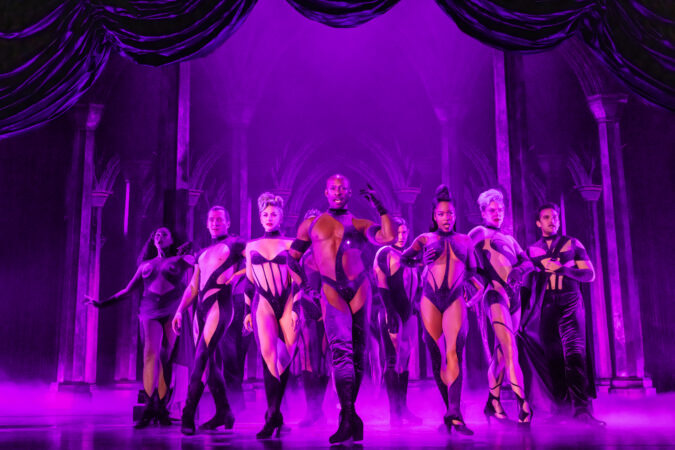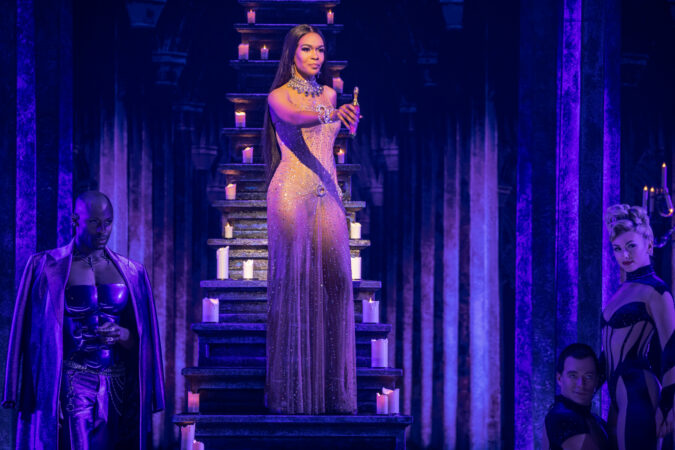This season on Broadway arguably boasts one of the gayest musicals to come down the pike in some years. And it鈥檚 somehow about two heterosexual women.
Yes, reader, we鈥檙e talking about Death Becomes Her, the splashy stage musical adaptation of the cult hit 1992 film currently playing Broadway鈥檚 Lunt-Fontanne Theatre. The show was tied with Maybe Happy Ending and Buena Vista Social Club to be the most Tony Award-nominated musical of the season (it won a prize for Paul Tazewell's oh-so-sparkly costume design). More importantly, the musical has consistently been packing them in at the Lunt Fontanne Theatre, a famously difficult house to fill. Stroll over to one of 9th Avenue's many fabulous gay bars, and you're more than liable to hear its title, if not the name of its Tony-nominated leading ladies Megan Hilty and Jennifer Simard, waft above the din of laughter and gossip. "Have you seen it yet? We went last month. Fabulous鈥擨 mean, they're a master class in comedy! Icons! Diva! Queen!" Boots the house down, etc.
But how does a musical about straight ladies become a favorite of (mostly) gay fellas? 鈥淔or most gay men, it鈥檚 just part of our culture,鈥� says the show鈥檚 Tony-nominated director-choreographer Christopher Gattelli of the film. 鈥淚t鈥檚 one of those movies that you just put on because it makes you laugh. It鈥檚 just ridiculous, so campy and fun.鈥�
That campy quality was why, according to Tony鈥搉ominated book writer Marco Pennette, the film was ripe for the stage musical treatment. "It was so over the top," he says. "It sang. It wasn't one of those shows where you wonder why they're making it a musical. This needed it."

On screen and stage, Death Becomes Her centers on two middle-aged women who, in a vie to hang onto their youth and beauty, down a magic potion that gives them eternal youth. But they soon learn the treatment has some gnarly side effects, like the ability to survive holes being blown clean through your abdomen. Needless to say, the end result is not exactly a tender drama. "You have two divas at the center of this thing who are trying to kill each other with shovels," Pennette laughs. "I don't think it can get campier than that."
Though Pennette is also gay, he didn鈥檛 set out to write a gay musical. 鈥淢aybe I鈥檓 a bad gay, but I just wanted to write jokes,鈥� he admits. 鈥淚 was going for [Dynasty divas] Linda Evans and Joan Collins.鈥� Ah, yes. Nothing gay at all there.
But while Pennette certainly opened the library writing some sick reads for his leading ladies to hurl at each other, the queer energy of Broadway's Death Becomes Her goes beyond the words coming out of the women's mouths. A major question mark fans had when we first found out the movie was coming to the stage was how they would achieve its many special effects live on stage. The film was quite the showcase of early CGI technology, using computers to turn Meryl Streep's head 180 degrees, and to make the smoky, gaping hole through Goldie Hawn's abdomen.
While the stage musical employs a variety of techniques to achieve similar feats, one of the more fun choices it makes is using鈥攁nd certainly not hiding鈥攖he use of stunt doubles. When Jennifer Simard pushes Megan Hilty down the stairs, her body tumbles and her bones break in slow motion thanks to an impressive act of acrobatics from the show's ensemblist Warren Yang, a former Olympic athlete who is dressed with only the slightest of believability in Hilty's costume and wig.
"It was something I found in the development process," Gattelli says of the gimmick, which got picked simply because it was the funniest option. "Why try to hide it? It helped me with the magic and with the tone, unlocking that. As opulent and luxurious as the show is, I wanted to rely on classic theatrical magic. It makes our show more accessible. It lets the audience in on the joke."
It also ends up paying homage to the show's connection to the queer community. What is a stunt double in a gown and a cheap wig if not a drag queen? And Yang certainly isn't the first man to dress up as the character. "Gay men and their costumes, right?" Pennette quips. "People showed up as Madeleine and Helen at opening night. It was so great鈥攖hey would have machinery making smoke come out of their stomachs with the hole cut out and stuff." Gattelli's stunt doubles are funny, sure鈥攂ut they also allow the show to tap into what's made its source material a cult favorite. The Broadway adaptation takes the movie out of the gay bar and puts it on a Broadway stage, and it invited the bar's drag queens along for the ride.
That's not to say the film didn't need a more modern eye in some respects. One of Gattelli's biggest goals in making a Death Becomes Her for 2025 was to explore what the story has to say about beauty ideals鈥攁nd how perhaps we shouldn't be so obsessed with being skinny, white, or cisgender. "Everyone's beautiful, so we made sure we're representing everyone across the board in the show, everyone's different looks and sizes and shapes," says Gattelli.
That crusade all too often starts and stops onstage with the actors, but Death Becomes Her carries that ethos offstage, too. The musical has, even for Broadway, a uniquely queer team of artists making it happen every night. The show鈥檚 backstage crew鈥攁 group typically dominated by the straight, white male set鈥攊s unusually queer.

Stanley Wiercinski, part of the show鈥檚 sound crew, says that working at the Lunt-Fontanne is uniquely comfortable and joyful. 鈥淚t makes for a fun work environment when you have like-minded people around you, people you鈥檙e not afraid to be yourself around,鈥� they say. "I grew up in an area that was not very queer, and even working in theatre I was very afraid to tell people about my gender identity, not for fear that the actors wouldn't accept me, but that I didn't know if people would hire me because of it. We like to say this industry is so inclusive, but it's still scary." Wiercinski's team is, to their knowledge, Broadway's only fully non-binary sound team.
That also means that the work is particularly gratifying. Wiercinski grew up watching the Death Becomes Her movie with their mom. To them, the queer community鈥檚 love for the film, and the current show, is a mark of something more poignant than jokes.
"It's always resonated with me as a queer person because of that idea that queerness can take away your childhood," Wiercinski reflects. For much of the queer community, childhood can be a painful time as the world tries its hardest to homogenize and hetero-normalize you, and then you end up spending much of your adulthood trying to get back to that child-like freedom you had before you cared what other people thought. Coming out starts a second life, a freer life. "You don't fully get to experience your youth until you come out and fully become yourself," they say. "I think there's a connection to a sense of wanting to be younger, or a sense of wanting to find that freedom that maybe you lost, or never really had to begin with."
Even as an out and proud queer adult, Wiersinski sees themselves in the show's themes. "I fret over what I wear all the time, because I want to feel comfortable in myself and the way I present, but I also want to feel accepted by the world with how I present," Wiersinski says. "It's a gay, queer way of living. You can't live in this world without thinking about what other people think about you. That's why I love the queer community. [Shows like Death Becomes Her] are over-the-top and hilarious, but when you dig a little deeper, there's meaning to be found. Camp is art. It's made to make you think about what it means, to make a statement."
When asked why he thinks Death Becomes Her, the movie and the musical, resonates so deeply with queer audiences, Gattelli answers: "I think in some way we all want to be seen, and we all want to be appreciated for what makes us different鈥攁nd [gay people] weren't for such a long time...When you're held down for so long and you finally get a chance to be yourself, people really come out of their shell in a much bigger, more fun way."
Through that lens, suddenly camp isn't merely funny; in some ways, it's a trauma response. And maybe that's the real magic of queer people: the ability to make laughter and joy out of pain, and in a way that doesn't diminish or attempt to hide that pain. As a gay man myself, that duality has come to feel like a gay superpower as I've grown older.

But here's the real tea, sis. On screen, Death Becomes Her was no runaway hit, making only the slimmest of profits (). It was panned by critics. So, it was the gay community that turned the film into the cultiest of cult hits.
And now, thanks to the work of its creators, and, probably, the seismic shift in public attitudes towards queer people over the last few decades (a reality we all need reminding of now more than ever), the Broadway musical has ushered Death Becomes Her from its place in gay subculture into the mainstream. You can't fill 1,500 seats eight nights a week with only gay people, after all. The show has been enjoying box office success by being welcoming鈥攁nd hilarious鈥攖o the gay community, and everyone else too.
Of course, that can be somewhat of a double-edged sword. In March, non-binary ensemble member Kolton Krouse that they would no longer be participating in the show's curtain call, because of "negativity and hatred" being hurled at them from the audience. While any amount of that nonsense is worth keeping from one's eyes and ears, that queerphobic bigotry is definitely in the minority in Death Becomes Her audiences. Most people, queer or otherwise, are laughing and loving what is, in its Broadway adaptation, a very gay musical鈥攁n openly, proudly gay musical. Just watch the Tony performance of the show's cheekily-titled opening number "For the Gaze" (get it?).
鈥淚t turns into this amazing communal experience where you鈥檙e seeing maybe a drag queen sitting next to some businessman who probably came right from work鈥攂ut they鈥檙e all laughing about it together, hitting each other in the arm, having a great time,鈥� Gattelli says proudly. 鈥淗ow great to create a space like that.鈥�
鈥淭he secret is that everybody鈥檚 invited,鈥� Pennette adds, 鈥渁nd everybody鈥檚 laughing. I don鈥檛 know if that would have happened 20 years ago. That鈥檚 progress.鈥� Slay, queen.






















